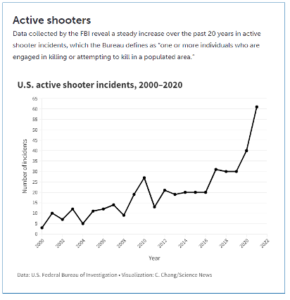As the unspeakable evil of mass shootings continue to increase, each of us are trying to understand what could be driving these tragedies. There are no shortage of explanations being bandied about with absolute certainty, from ineffectual gun control laws, mental illness, peer bullying, first-person shooter video games, violence in movies and television shows, growing personal anger and alienation. Fatherlessness has even been mentioned as a driver. Others strongly deny the linkage and blame guns.
Senator Mike Lee, R-Utah, considered the role of family breakdown and fatherlessness in a recent Senate Judiciary Committee hearing. Lee said, “Every time one of these tragedies occurs, for too long we have failed to look back at the root causes of rampage violence. Why is our culture all of sudden producing so many young men who want to murder innocent people?” Lee continued, “It raises the question, could fatherlessness, the break-down of the family, isolation from civil society or the glorification of violence be contributing factors?”
The Senator is asking important questions. But others disagree.
A faculty member at the highly conservative Brigham Young University recently opined in the Mormon-owned Deseret News that “as a sociologist of family and fatherhood, I can tell you that the best available evidence suggests that neither is responsible for the increase in these horrific events.” He denies father absence and family breakdown are drivers. He says its guns.
But leading mainstream sociologists and the larger body of data disagree with this dismissal. Brad Wilcox, a sociologist at the University of Virginia and founder and Senior Fellow at the Institute for Family Studies, contends, “Sen. Mike Lee is right to wonder if fatherlessness and family breakdown are factors in the tidal wave of violence that has engulfed America since 2020.”
Professor Wilcox adds, “We know that young men who are raised without the benefit of good fathers are more likely to engage in violent behavior. Of course, other factors are also likely in play…”
It has long been consistently demonstrated that fatherlessness, violence, and criminal behavior go together in dramatic ways. The U.S. Department of Justice explains that the Journal of Research in Crime and Delinquency reported in 1997 that “the most reliable indicator of violent crime in a community is the proportion of fatherless families.” This scholarly journal also reported, “According to a 1993 Metropolitan Life Survey, ‘Violence in America’s Public Schools,’ 71 percent of teachers and 90 percent of law enforcement officials state that the lack of parental supervision at home is a major factor that contributes to the violence in schools.” And fatherlessness decreases the amount and quality of this supervision dramatically.
More recently, a 2021 meta-analysis in the scientific journal Psychology, Crime & Law examined 48 different academic studies on the relationship between fatherlessness and criminal behavior, finding a remarkably strong correlation. These scholars explain, “the results suggest that growing up in a single-parent family and adolescent involvement in crime are related since a large majority of the studies shows a positive relation between single-parent families and the level of crime.” They add their findings are “in accordance with previous literature reviews” on the topic.
These scholars seem to agree with leaders like Senator Mike Lee when they conclude their journal article with this encouragement: “it is important to investigate in more detail how this relation between single-parent families and crime works to ensure that criminal behavior by adolescents is minimized.”
Deserert News countered such findings with curious statements from a variety of miscellaneous scholars like Shawn Fremstad, a scholar at the Center for Economic Policy Research,
“Mass shootings are extreme events, so we don’t have a lot of demographic or survey data to look at, but there is no evidence-based reason for believing that mass shootings are caused by single mothers, grandmothers who raised their grandchildren or lesbian couples, all examples of ‘fatherless’ household arrangements.”
Fremstad is correct from a number of angles. But wrong in others.
Yes, the violent and public slaughter of innocent lives with high-powered guns is an extreme event that confounds all reason. And no one is saying fatherlessness alone is driving such tragedies. But to dismiss it altogether is unsound.
There has not been a great deal of research breaking down the psychological profiles and reasoning behind such shootings. But there has been some, as we will examine below. But isolating single reasons for such madness is nearly impossible because such atrocities challenge any sort of reasoning. It is nearly impossible to find reasons for inherently irrational actions. And certainly, a mass shooter does not a fatherless home create. But it certainly does cause all such children to walk with significant emotional, developmental and spiritual limps.
That is the problem with trying to explain the unspeakable evil of mass shooting with a single driver like gun possession, mental illness, violent video games, or the breakdown of the family. Yes, psychologists find that fatherlessness negatively impacts nearly every measure of well-being for children, including criminal and violent behavior. Sociologists find the same thing. Fatherlessness does not generally benefit any measure of child well-being. None.
But guns and fatherlessness have been widely experienced in our society for decades. Neither can be isolated as the primary cause of the dramatic increase in mass shootings we are experiencing in the last twenty years. There must be other troubling factors as well.

The U.S. Department of Justice’s National Institute of Justice (NIJ) recently reported that “[p]ersons who committed public mass shootings in the U.S. over the last half century were commonly troubled by personal trauma before their shooting incidents, nearly always in a state of crisis at the time.” Specially, NIJ reported, “Suicidality was found to be a strong predictor of perpetration of mass shootings.” In fact, among young people, NIJ reports that 92% of mass shooters committed by those in the K-12 age range were found to be suicidal at the time of the shootings and 100% of college-age shooters were suicidal at the time!
Family breakdown and father abandonment certainly fit as a major life driver of such individual pain and life trauma. Who can deny this fact? But we must also be open to considering additional evils at work today driving such horrific social problems if we are going to find real solutions. Human behavior is indeed complex. Pure evil is too and that is what each mass shooting is.
Photo from Shutterstock.






